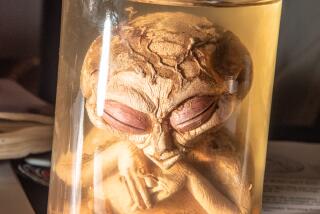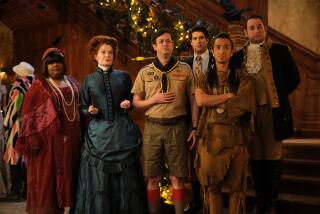Talking to the Dead, Part Two: the Skeptics
- Share via
Talking to the Dead II. . . .
The response was heavy concerning my recent face-to-face chat with James Van Praagh, the mesmerizing spiritualist medium who claimed to communicate with my dead stepfather, just as he regularly had made contact on television with others who have “passed over.”
What makes Van Praagh a TV story is his increasing visibility on NBC as a quasi-regular on the new daytime talk series “The Other Side” and as the scheduled subject of a yet-to-be-taped segment of “Unsolved Mysteries,” in which he will be asked to contact the dead on behalf of 10 people whose identities, the show says, will not be revealed to him beforehand. Some will be believers in the spiritual world with which Van Praagh claims a schmoozing relationship, others will be skeptical.
Van Praagh knew I was dropping by his West Hollywood residence, but not that it was my stepfather I wanted him to contact. During our session, he got some things wrong about my family and some things right (most of which could have been logical deductions), but a couple of times he was so inexplicably on target that even I, the great skeptic about such things, was jolted.
Dottie Buck of Los Angeles read the column and empathized: “I, too, have sat with James Van Praagh. I agree (that) talking with the dead can be a real pain. We contacted my dead grandmother. I had to hear from the other side--from across the dimensions--to clean my room?”
But David J. Simmons of Ridgecrest knew a sucker--me--when he read one, citing my “naivete about how to go about interviewing someone who ‘communicates with the dead.’ ” After detailing my ineptitude, Simmons hoped that I would be better prepared for my next “interview with the supernatural.” Other calls and letters tended to agree with Simmons’ criticism of me.
What! Me . . . naive? A courageous, muckraking, investigative reporter--who once wrote a column about his costly calls to the TV-advertised Psychic Hotline--a patsy? Stung by the accusations, I sought the real scoop about Van Praagh from Michael Shermer, publisher of Skeptic Magazine and assistant professor of science history at Occidental College.
Shermer was, well, skeptical. “Gosh, there’s just almost no chance. I mean, think about the claim that’s being made, that people actually did live beyond this life. It’s outrageous. The only evidence we have is this fuzzy hit-and-miss thing that he (Van Praagh) does.”
Fuzzy hit and miss? Hadn’t Van Praagh relayed things to me from my stepfather that accurately reflected my life? “I talked to a couple of my mentalist buddies about him,” Shermer said. “A mentalist is a magician who does mental magic. They study demographics. They get to know people’s characteristics just like a marketing executive would. If you get someone who is white and 45, you know that he has 3.5 kids and such and such.”
But some of Van Praagh’s stuff seemed pretty specific. “Most likely he got something on you through the computer system,” Shermer said. “He might have been able to track down pathways even you don’t know about.”
Yes, but well into our session, Van Praagh mentioned Oregon in connection with me. Oregon, the state where my daughter’s fiance had been spending a lot of time working on a ballot initiative. There had been a slew of phone calls between my house and Oregon in recent weeks. How would Van Praagh know about Oregon?
“Sometimes you get lucky,” Shermer said. “We had an event at Caltech last year where we brought Houdini back from the dead. Mark Edward was the mentalist. We had 13 people at a table holding hands, and Mark was divining these amazing facts about people. He got this woman’s birthday. It so happens it was also my wife’s birthday. My wife said, ‘That’s my birthday!’ He said, ‘I know. Both of you have the same birthday.’ I asked him afterward how he knew. He said it was pure luck, that you always take credit for lucky guesses.”
I called Edward, who quoted a line that he said mentalists have used for years: “If I could really do that, I’d go to the race track.”
Describing himself as a “psychic entertainer,” Edward said: “I’m not as skeptical as Michael is. I believe that there are people who are sensitive, and there are people who are clever manipulators of information. In my experience, the people who really have this clairvoyant ability don’t advertise it. The last thing they want to do is go on television. They’re low-key and they don’t want to be bothered. So, I’m not saying such things can’t happen. But it’s not like you turn on a tap and suddenly you know about someone’s great-grandfather. I don’t even have to see this guy (Van Praagh) to know that he’s using techniques that, if I was sitting in on it, I could nail him.”
But what about the seemingly specific information Van Praagh conveyed to me? “There is so much information available to computer programs, that you have no privacy at all,” Edward said. “If I have your Social Security number, I can tell you the first car you bought and what color.”
I told Edward the Oregon story. “And you say they (my daughter and her fiance) made phone calls?” he asked. Was he implying that phone records. . . .
“I have no idea,” Edward said. “All I’m saying is that the information highway has a lot of lanes on it.”
Next I told my tale to the great debunker himself, relentlessly skeptical James (The Amazing) Randi, a professional magician especially renowned for his work with the Committee for the Scientific Investigation of the Claims of the Paranormal, which he founded with Carl Sagan, Isaac Asimov and Martin Gardner.
Randi was aware of “The Other Side,” the series making Van Praagh famous. “It angers me so much that this kind of crap is presented to the American public,” he said. “The host throws in an occasional monkey wrench (devil’s advocate question), but a monkey wrench made of chop suey.”
People usually hear from so-called spiritualists what they want to hear and “ignore things that don’t work,” Randi said. He agrees with Shermer that those claiming to communicate with the dead often exploit the emotions of vulnerable survivors.
Van never seems to encounter a dead person unhappy about being dead, which makes the surviving loved ones happy. In a sense, he’s a Doctor Feelgood who sells hope. So what’s the harm? “Heroin makes people feel better, too,” Randi replied, “but you can’t function in the real world with heroin.”
Amazing as he is, how can Randi be certain that Van Praagh and others cannot communicate with the dead? “I can’t,” he said. “But the onus is not on me, it’s on them.”
What Van Praagh can’t do, apparently, is communicate with West Hollywood cops. Because he lives on a side street with limited parking, he suggested that I park my car in the driveway behind his. Although my car extended across the sidewalk, he assured me that it would be all right. It wasn’t. Returning to my car, I found a parking ticket on the windshield, a stain on Van Praagh’s credibility.
Still, we’ll always have Oregon.
More to Read
The complete guide to home viewing
Get Screen Gab for everything about the TV shows and streaming movies everyone’s talking about.
You may occasionally receive promotional content from the Los Angeles Times.






